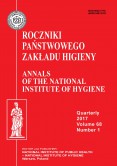Rocz Panstw Zakl Hig 2021, 72(2): 123-136
Link between methyl nutrients and the DNA methylation process in the course of selected diseases in adults
[Link between methyl nutrients and the DNA methylation process in the course of selected diseases in adults]
ABSTRACT
DNA methylation is a reversible epigenetic modification that plays a crucial role in transcriptional gene silencing. Both excessive (hypermethylation) and reduced DNA methylation (hypomethylation) can contribute to the disturbance of the proper course of many important processes in the human body. The aim of the study was to discuss the relationship between methyl nutrients and the DNA methylation process in the course of selected diseases in adults. Methyl nutrients include folates (vitamin B9), riboflavin (vitamin B2), cobalamin (vitamin B12), pyridoxine (vitamin B6) and choline (vitamin B4), as well as methionine and betaine. These substances play the role of both substrates and cofactors in transformations related to one-carbon metabolism. The deficiency of methyl nutrients in the body can lead to disturbances in SAM synthesis, which is the primary donor of methyl groups in the DNA methylation process. However, the mechanism explaining the discussed relationship has not been fully explained so far. Both the concentration in the body and the intake of folate and vitamin B12 in the diet can, to some extent, have an effect on the level of DNA methylation in healthy people. In comparison, data on the effect of excessive intake of vitamin B12 in the diet on the risk of cancer development are inconsistent. An adequate betaine and choline intake in the diet might not only affect the overall improvement of the DNA methylation profile, but, to some extent, also reduce the risk of cancer, the effect of which can depend on the content of folic acid in the body. Research results on the effect of supplementation of methyl nutrients on the DNA methylation process are inconclusive. It is therefore necessary to conduct further research in this area to draw clear conclusions.
STRESZCZENIE
Metylacja DNA jest odwracalną modyfikacją epigenetyczną, która odgrywa kluczową rolę w transkrypcyjnym wyciszaniu genów. Zarówno nadmierna (hipermetylacja), jak i zmniejszona metylacja DNA (hipometylacja) mogą przyczyniać się do zaburzenia prawidłowego przebiegu wielu istotnych procesów zachodzących w organizmie człowieka. Celem pracy było omówienie związku między metylowymi składnikami diety a procesem metylacji DNA w przebiegu wybranych chorób u osób dorosłych. Do metylowych składników pokarmowych zaliczane są: foliany (witamina B9), ryboflawina (witamina B2), kobalamina (witamina B12), pirydoksyna (witamina B6) i cholina (witamina B4) oraz metionina i betaina.
Substancje te pełnią zarówno rolę substratów, jak i kofaktorów w przemianach związanych z metabolizmem jednego atomu węgla. Niedobór metylowych składników pokarmowych w organizmie może prowadzić do zaburzeń w syntezie SAM, będącej podstawowym donorem grup metylowych w procesie metylacji DNA. Mechanizm wyjaśniający omawianą zależność nie został jednak dotychczas w pełni wyjaśniony. Zarówno stężenie w organizmie, jak i podaż w diecie folianów oraz witaminy B12 mogą w pewnym stopniu oddziaływać na poziom metylacji DNA u osób zdrowych, przy czym dane dotyczące wpływu nadmiernej zawartości witaminy B12 w diecie na ryzyko rozwoju nowotworów są niespójne. Odpowiednia podaż betainy i choliny w diecie może wpływać korzystanie nie tylko na ogólną poprawę profilu metylacji DNA, ale w pewnym stopniu również na zmniejszenie ryzyka wystąpienia nowotworów, przy czym efekt ten może być zależny od zawartości kwasu foliowego w organizmie. Wyniki badań odnoszące się do wpływu suplementacji metylowymi składnikami pokarmowymi na przebieg procesu metylacji DNA są niejednoznaczne. Konieczne jest prowadzenie dalszych badań w tej dziedzinie w celu sformułowania jednoznacznych wniosków.
Liczba pobrań: 3204


